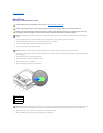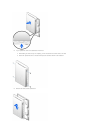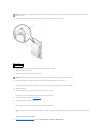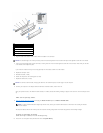
Back to Contents Page
Hard Drive
Dell™OptiPlex™SX260SystemsUser'sGuide
1. If you are replacing a hard drive that contains data you want to keep, back up your files before you begin this procedure.
2. Check the documentation for the drive to verify that it is configured for your computer.
3. Perform an orderly computer shutdown using the operating system menu.
4. Turn off your computer and any attached devices.
5. Disconnect your computer from the power adapter and devices from their power sources. Also, disconnect any telephone or telecommunication lines
from the computer.
6. Press the power button to ground the system board.
7. Remove the computer from the mounting plate (if used).
8. Remove the cable cover, if it is attached.
9. Slide the release button as shown in the illustration.
10. Rotate the hard-drive door up and remove the drive cable from the drive connector.
11. Raise the release tab, and slide the drive up and away from the plastic door.
CAUTION: Before you begin this procedure, follow the steps in "CAUTION: Safety Instructions."
CAUTION: To guard against electrical shock, always unplug your computer from the power supply before removing the hard drive.
CAUTION: To prevent static damage to components inside your computer, discharge static electricity from your body before you touch any of
your computer's electronic components. You can do so by touching an unpainted metal surface on the computer chassis.
NOTICE: To avoid damage to the drive, do not set it on a hard surface. Instead, set the drive on a surface, such as a foam pad, that will sufficiently
cushion it.
NOTICE: To disconnect a network cable, first unplug the cable from your computer, and then unplug it from the network wall jack.
1
release button
2
hard-drive door
3
drive cable
4
drive connector
NOTICE: Before touching anything inside your computer, ground yourself by touching an unpainted metal surface, such as the metal at the back of the
computer. While you work, periodically touch an unpainted metal surface to dissipate any static electricity that could harm internal components.


















